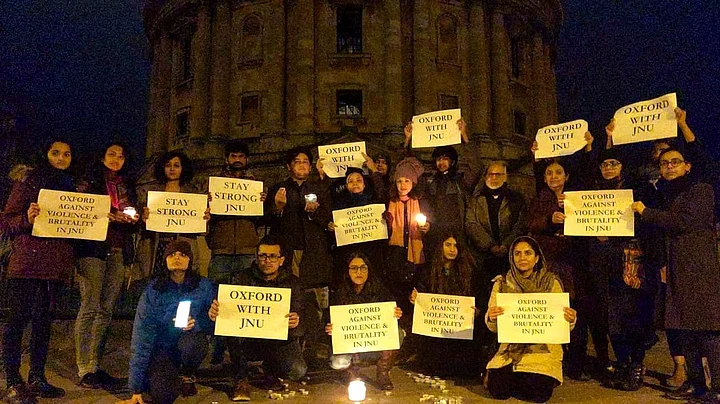Even as nearly all of India has taken to the streets to protest against what is being seen largely as a discriminatory Citizenship Amendment Act 2019, Kashmir Valley has largely remained silent, a place which used to always be a seat of dissent.
“If they cannot feel our pain, how do they expect us to wail at their suffering,” says Adil Rashid, a Kashmiri, who is an active member of the civil society in South Kashmir.
Is Kashmir Too Tired to Protest?
Kashmir was rendered an open-air ‘prison’ after the scrapping of Article 370 and subsequent downgrading of J&K’s status to that of a UT, and its bifurcation. We were under curfew for months, and we continue to live without internet. Few from mainstream India's Muslim fraternity raised their voices seeing our plight. “Our children were picked up in the dead of night and put into jail cells of Agra,” Adil adds.
“We were ignored by them in our bad times, so we are behaving as others in their bad times,” he concludes.
While many reflect on the seeming apathy of Indian Muslims towards the oppression of Kashmir, many state that the Kashmiris have gotten ‘fed up’ of protesting against a State of ‘lawless laws’.
“It is not only the security forces’ presence and the insensitivity of outside Muslims towards us that is contributing to the silence of masses here in Kashmir. But it is the non-yielding nature of protests that have made the people fed up,” says Farzana Nisar, a journalist based in Srinagar.
Farzana adds that you can protest against a State that understands and abides by laws, but when the law enforcement agencies are ‘used’ by the State ‘lawlessly’, and the law itself is manipulated, the protests no more hold meaning.
“This is what the Kashmiris have finally understood, and thus, are silent,” she says.
Crushing of Dissent & Student Activism
Students in Kashmir have been barred from forming any official students’ union. Though some unofficial bodies exist, owing to the sensitivity of the situation in the Valley, they too have stopped themselves from carrying out activities.
“We don’t even hold any educational seminars. The State which has crushed the space for any political reformation cannot be trusted to support, or for that matter, even let any kind of student activism prevail,” says Mudasir Dar, president of AJKSU ( All Jammu and Kashmir Students Union).
Mudasir, along with many other activists, had collaborated to form AJKSU. This was an attempt by them to be a representative in a space which didn’t have official student unions.
However, after conducting a few seminars on the Kashmir conflict, Mudasir says that a ‘fear psychosis’ had developed within the union. “We were targeted by the law enforcement agencies for promoting separatist sentiments, and many times by the militant organisations too, blaming us for carrying on with Indian propaganda.”
An ‘Education Shutdown’ In Kashmir Since 5 August
“However, despite many attempts to subdue, we kept on working. But recently, everything came to a standstill after we were told that you cannot carry on with even with a peaceful gathering, when we tried to raise our voice against the internet ban in Pratap Park at Srinagar, last month,” Mudasir continued.
“Since then, no one wants to come to the forefront. No one wants to land up in a ‘prison’ thousands of kilometres away from home, for holding a banner of solidarity. No one wants to be jailed for the demand of being freed from an ‘open-air prison’ that India is becoming for Muslims,” Mudasir concludes.
As universities like Jamia and Aligarh Muslim University have been largely shut in the wake of the anti-CAA protests, it must be noted that schools in the Kashmir Valley have largely remained shut since 5 August. Also, it has been more than 125 days since the University of Kashmir has functioned.
Kashmir Post Bifurcation: No Space to Mourn
A few journalists in Kashmir, including Azaan Javaid of The Print, were recently roughed up by the security forces while they were merely conducting their professional duties. A video of armed personnel hitting Azaan had recently gone viral.
Shaista Nazir, a student of political science at the University of Kashmir, says that ‘even if we wanted to protest, not against the CAA but for what happened in JMI, we are not allowed to gather somewhere together’. She adds that it is not an official declaration of restricting students from gathering, but things here in Kashmir have been ‘planned’ in a way that a bigger gathering does not take place.
Seerat, a journalism student, says, “We are helpless about what is being done here in Kashmir and now in the rest of India to students. Leave protest, we are not even allowed to mourn together,” he concludes.
(Umar Sofi is a freelance journalist based in Kashmir. He can be reached at Sofiumer5967@icloud.com. This is a personal blog. The views expressed are the author’s own. The Quint neither endorses nor is responsible for them.)
(At The Quint, we question everything. Play an active role in shaping our journalism by becoming a member today.)
